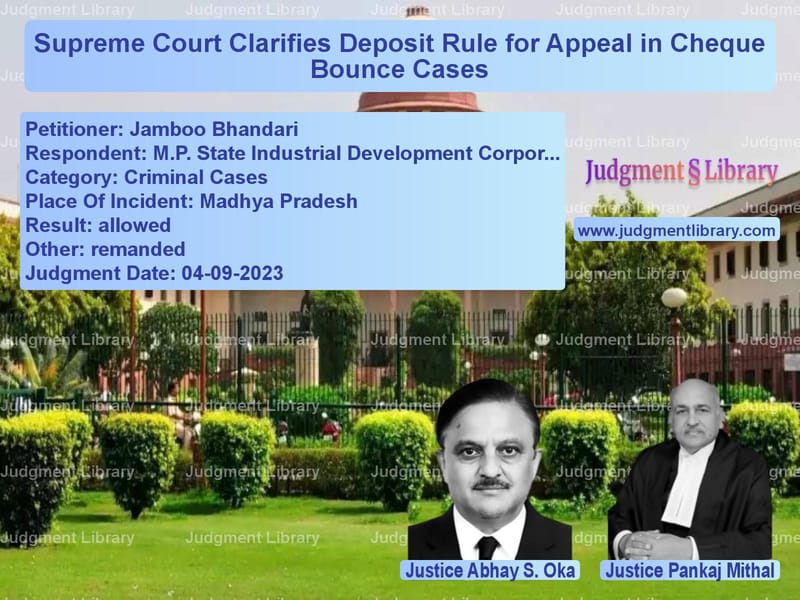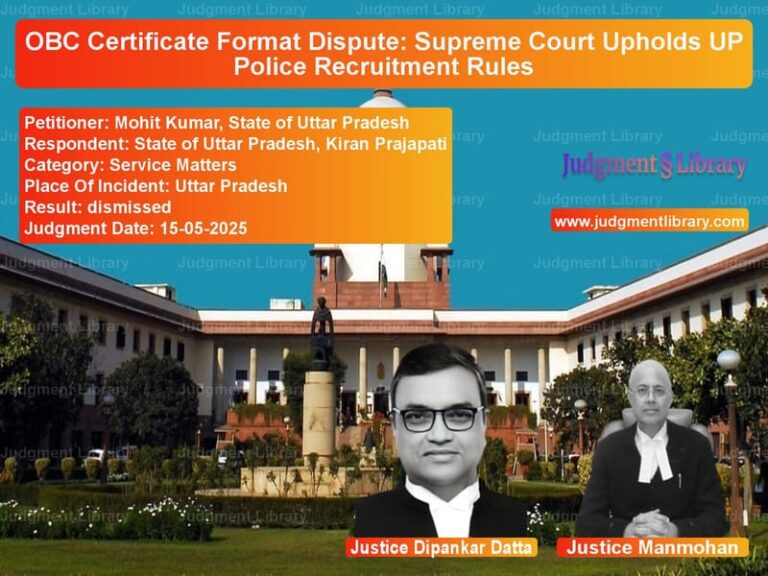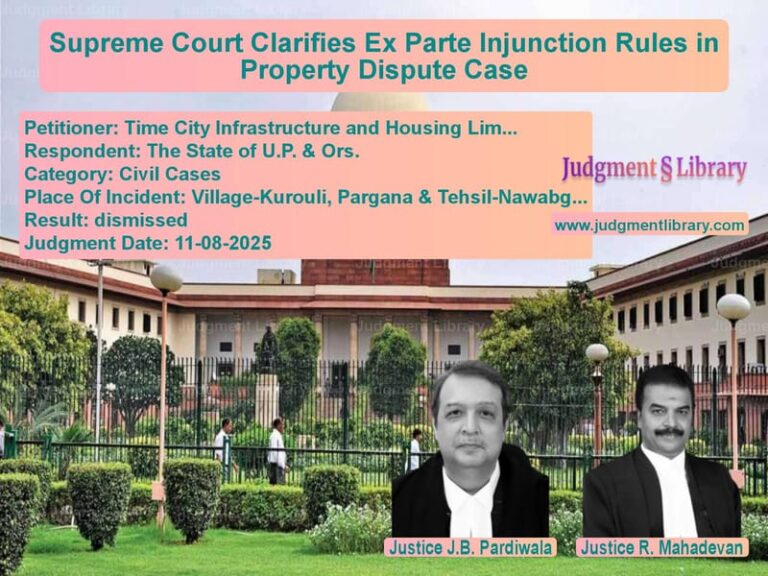Supreme Court Clarifies Deposit Rule for Appeal in Cheque Bounce Cases
The Supreme Court of India has ruled that the requirement for an appellant to deposit 20% of the compensation amount under Section 148 of the Negotiable Instruments Act, 1881 (N.I. Act) is not an absolute rule and can be waived in exceptional cases. This decision, in the case of Jamboo Bhandari vs. M.P. State Industrial Development Corporation Ltd., sets an important precedent for cheque bounce cases under Section 138 of the N.I. Act.
Background of the Case
The case arose from a cheque bounce dispute involving the appellants, Jamboo Bhandari and others, who were convicted by the Judicial Magistrate under Section 138 of the N.I. Act. The trial court sentenced them to pay the cheque amount of ₹2,52,36,985 with 9% annual interest.
The appellants challenged their conviction before the Sessions Court, which, under Section 389 of the Code of Criminal Procedure (CrPC), granted suspension of sentence on the condition that they deposit 20% of the compensation amount as per Section 148 of the N.I. Act. The Madhya Pradesh High Court upheld this condition, leading to an appeal before the Supreme Court.
Legal Issues Considered
The case raised the following legal questions:
- Is the requirement to deposit 20% of the compensation amount mandatory under Section 148 of the N.I. Act?
- Does the appellate court have the discretion to waive this requirement in exceptional cases?
- Was the High Court correct in upholding the deposit condition without considering exceptions?
Petitioner’s Arguments (Jamboo Bhandari)
The appellants, represented by Vinayak Bhandari, argued:
- The requirement to deposit 20% of the compensation amount should not be treated as an absolute rule.
- The trial court’s order was excessive and did not consider their financial capacity.
- The High Court failed to examine whether the case fell under an exception to the deposit rule.
- Failure to deposit the amount would deprive them of their right to appeal, violating Article 21 (Right to Life and Personal Liberty).
Respondents’ Arguments (M.P. State Industrial Development Corporation Ltd.)
The respondents, represented by Sushil Dutt Salwan, contended:
- The requirement to deposit 20% of the compensation amount is mandatory under Section 148 of the N.I. Act.
- The appellants never requested an exception before the Sessions Court or the High Court.
- Granting exemptions would weaken the deterrent effect of cheque bounce penalties.
Supreme Court’s Observations
The bench, comprising Justices Abhay S. Oka and Pankaj Mithal, made the following key observations:
1. Section 148 N.I. Act is Not an Absolute Rule
The Court held that while Section 148 directs appellate courts to order the deposit of at least 20% of the compensation amount, there is room for exceptions:
“Normally, appellate courts will be justified in imposing the deposit condition. However, in exceptional cases, if the deposit of 20% would be unjust or deprive the appellant of the right to appeal, the court may waive this requirement.”
2. High Court Erred in Not Considering Exceptions
The Court ruled that the High Court had wrongly assumed that the deposit requirement was an absolute rule and failed to consider exceptions:
“The High Court proceeded on the erroneous premise that deposit of a minimum 20% is an absolute rule, without any exception.”
3. Appellate Court Must Assess Hardship
The Court emphasized that appellate courts should assess whether the deposit requirement imposes undue hardship:
“If the appellate court concludes that enforcing the deposit would amount to a deprivation of the right to appeal, it must record specific reasons and grant an exception.”
4. Blanket Orders Are Not Sufficient
The Supreme Court clarified that whenever an accused applies for a suspension of sentence under Section 389 CrPC, the appellate court must independently assess whether an exception applies:
“The court cannot pass a blanket order assuming that the deposit requirement is non-negotiable. The case must be examined to determine if it falls within an exception.”
Final Verdict
The Supreme Court ruled:
- The Madhya Pradesh High Court’s order upholding the 20% deposit requirement was set aside.
- The appellants’ revision petitions were restored before the High Court.
- The High Court must reconsider the deposit condition based on the principles laid down in the judgment.
- The interim suspension of sentence granted earlier by the Supreme Court will continue until the High Court rules on the matter.
Implications of the Judgment
This ruling has significant implications for cheque bounce cases:
- Clarifies that Section 148 is not an absolute rule: Courts must examine exceptions where deposit requirements cause undue hardship.
- Protects Right to Appeal: Ensures that financial constraints do not prevent an accused from filing an appeal.
- Reinforces Judicial Discretion: Appellate courts must assess individual cases rather than apply a blanket rule.
- Impacts Future N.I. Act Cases: Courts across India will now have to justify deposit conditions with reasoned orders.
Conclusion
The Supreme Court’s ruling in Jamboo Bhandari vs. M.P. State Industrial Development Corporation Ltd. ensures a balanced interpretation of Section 148 of the N.I. Act. While it upholds the general rule of deposit requirements in cheque bounce cases, it also protects appellants from undue hardship, reinforcing the principle that justice must be accessible to all.
Petitioner Name: Jamboo Bhandari.Respondent Name: M.P. State Industrial Development Corporation Ltd..Judgment By: Justice Abhay S. Oka, Justice Pankaj Mithal.Place Of Incident: Madhya Pradesh.Judgment Date: 04-09-2023.
Don’t miss out on the full details! Download the complete judgment in PDF format below and gain valuable insights instantly!
Download Judgment: jamboo-bhandari-vs-m.p.-state-industria-supreme-court-of-india-judgment-dated-04-09-2023.pdf
Directly Download Judgment: Directly download this Judgment
See all petitions in Cheque Dishonour Cases
See all petitions in Debt Recovery
See all petitions in Bail and Anticipatory Bail
See all petitions in Judgment by Abhay S. Oka
See all petitions in Judgment by Pankaj Mithal
See all petitions in allowed
See all petitions in Remanded
See all petitions in supreme court of India judgments September 2023
See all petitions in 2023 judgments
See all posts in Criminal Cases Category
See all allowed petitions in Criminal Cases Category
See all Dismissed petitions in Criminal Cases Category
See all partially allowed petitions in Criminal Cases Category







